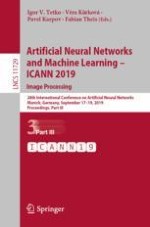2019 | OriginalPaper | Buchkapitel
Generative Adversarial Networks for Operational Scenario Planning of Renewable Energy Farms: A Study on Wind and Photovoltaic
verfasst von : Jens Schreiber, Maik Jessulat, Bernhard Sick
Erschienen in: Artificial Neural Networks and Machine Learning – ICANN 2019: Image Processing
Aktivieren Sie unsere intelligente Suche, um passende Fachinhalte oder Patente zu finden.
Wählen Sie Textabschnitte aus um mit Künstlicher Intelligenz passenden Patente zu finden. powered by
Markieren Sie Textabschnitte, um KI-gestützt weitere passende Inhalte zu finden. powered by
